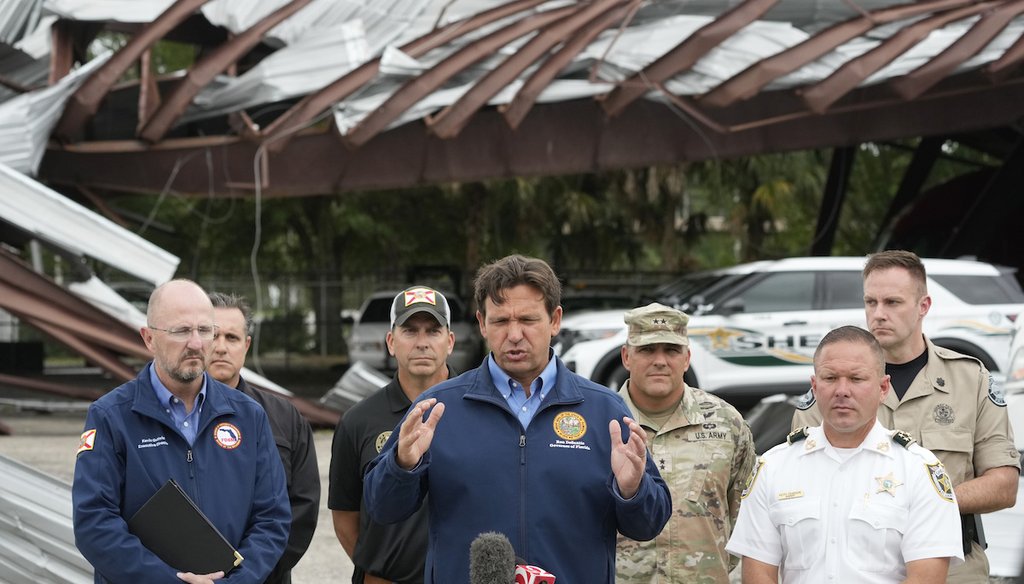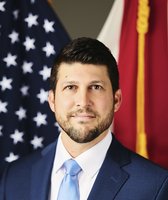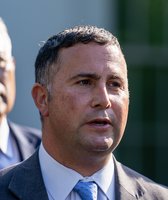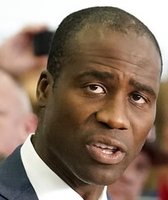Stand up for the facts!
Our only agenda is to publish the truth so you can be an informed participant in democracy.
We need your help.
I would like to contribute

Florida Gov. Ron DeSantis speaks during a news conference in front of a St. Lucie County Sheriff's parking facility that was damaged by a tornado spawned ahead of Hurricane Milton on Oct. 10, 2024, in Fort Pierce. (AP)
Hurricanes Helene and Milton made landfall in Florida within two weeks, leaving a trail of destruction. Gov. Ron DeSantis, R-Fla., dismissed any link between climate change and the storms, saying "there’s nothing new under the sun."
In an Oct. 10 press conference in Fort Pierce, a town on Florida’s east coast damaged by tornadoes spawned from Hurricane Milton, DeSantis shifted between conspiracy theories that claim the government was controlling the weather and people who blamed global warming for stronger storms.
"If I could control the weather, I would do 78 (degrees) and sunny year-round," DeSantis said. "This is on both sides. You kind of have some people think government can do this, and others think it's all because of fossil fuels. The reality is what we see. There's precedent for all this in history, like, it is hurricane season, you are going to have tropical weather."
DeSantis said Florida has seen storms that were "head and shoulders" above others in the 19th century. He said the intense Oct. 9 tornado outbreak from Milton "is to be expected to a certain extent." Officials at the news conference said they counted around 25 tornadoes in one day — the state’s yearly average is 50 — with one killing at least five people in St. Lucie County, where Fort Pierce is.
DeSantis has a point that Florida has a long record of powerful hurricanes. However, it’s not straightforward to compare storms from the 1800s with now because of inconsistent historical data. The science about climate change’s role in hurricanes is still considered unsettled, experts told us, but more recent studies looking at the past 40 years have found that the storms forming now tend to be stronger than in the past.
Kerry Emanuel, a climate scientist specializing in hurricane physics at the Massachusetts Institute of Technology, said DeSantis is correct that there have been more intense hurricanes and storms with even more tornadoes than in Florida's past.
"However, he is wrong about the larger point that climate change is not having an effect on hurricanes," Emanuel wrote in an email. "Observations, theory, models, and expert opinion are all well converged on hurricanes becoming more intense and, especially, on their producing heavier rain and more damaging storm surges."
Brian McNoldy, a senior research associate at the Rosenstiel School of Marine, Atmospheric, and Earth Science at the University of Miami, said there are trends that show increased rainfall and some storms intensifying faster.
Overall, he said, "climate change's role in influencing hurricanes is very complex, and still has quite a bit of uncertainty." Various hurricane trend lines, depending on the timeframe, the metric being evaluated and the area studied, have remained flat or haven’t been statistically significant; one reason why scientists say they need more homogenous data.
Jeff Chanton, an environmental science and oceanography professor at Florida State University, said he thinks the science is clear that global warming has been contributing to stronger storms, as hurricanes feed on warmer water.
Hurricanes form when humid air over warm ocean waters flows upward and creates clouds from the water the air releases. The air rotates as it rises, and it grows as warm water and warm, moist air feeds it. The warmer the air, and the warmer the ocean waters, the stronger the hurricane.
"Driving the warmer water temperatures is increased greenhouse gas concentrations in the atmosphere," Chanton said, "and that's the result of fossil fuel burning, as well as methane emissions from cows and landfills, and various human activity."
Historical data on hurricanes is inconsistent
The historic record on hurricanes is riddled with data problems, climate scientists and meteorologists told us.
The further back you go, the greater the chance that some hurricanes went uncounted, even the ones that hit land. Intensity measurements came later and have been tweaked over time, making it difficult to compare changes.
Available data shows hurricane activity has fluctuated over time and leads to no discernable trend in the frequency of storms, experts said.
For example, many researchers believe that from around 1960 to 1980, a period of lower hurricane activity, aerosol pollutants likely counteracted global warming by reducing the sunlight that warmed the ocean. This would mask greenhouse gases’ effect on hurricane trends. When clean air legislation removed those pollutants, scientific and public climate focus shifted to greenhouse gas warming.
"We are data-limited when we look at intensity changes over the whole (Atlantic) basin," said Tom Knutson, a NOAA senior scientist who studies hurricanes and climate change. "Using climate models, we think storms should be having higher rainfall rates and should be getting a bit more intense. But with the frequency of storms we aren't sure — they may be decreasing. The problem is we don't have great data to confirm what our models are saying."
Available Atlantic hurricane data doesn’t provide compelling evidence for a "substantial greenhouse warming-induced century-scale increase" in the frequency or intensity of hurricanes, according to NOAA’s webpage about climate change and hurricanes. But the page also notes that greenhouse warming is projected to intensify hurricanes globally and increase rainfall amounts.
DeSantis’ focus on a portion of past hurricanes that made landfall omits many storms around the world.
"One has to remember that only about 12% of all hurricanes occur in the Atlantic and only about a third of those make landfall in the U.S.," Emanuel, from MIT, previously told us. "So he is talking about roughly 4% of all hurricanes."
Recent studies show an increase in rapid intensification
Studies over the last several decades, meanwhile, contain more robust data and show some clear trends.
In an email, McNoldy wrote that the latest science shows two prominent hurricane trends: increased rainfall from tropical cyclones and increased frequency of rapid intensification.
In one 2020 study, researchers at NOAA and the University of Wisconsin at Madison found that the likelihood of major hurricanes are increasing because of human-caused warming.
Authors created a dataset from 1979 to 2017 of satellite-based storm intensity estimates for tropical cyclones, which includes hurricanes and typhoons, around the world. They found a global increase of about 8% per decade of the likelihood that a given tropical cyclone will become a Category 3 or greater (Category 3 is the midpoint on a 1-to-5 intensity scale). They also found the observed trends match computer simulations of a warming world.
Research in 2019 found that hurricanes in the North Atlantic were intensifying more quickly. A 2022 study found a global increase in storms that intensify rapidly, with wind speeds increasing by 65 miles per hour or more within a 24-hour period.
A 2023 Princeton University paper argued that climate change may make back-to-back hurricanes, as we saw with Helene and Milton, more common. Researchers ran simulations to determine the likelihood of multiple destructive storms hitting the same area within a short period, and considered future scenarios with moderate carbon emissions and with higher emissions. In both, the chance of consecutive storms increased dramatically.
The authors said rising sea levels and increasing precipitation fueled by climate change are increasing the risk for major storms hitting the same places site in quick succession.
"It is likely that the global proportion of major (Category 3-5) tropical cyclone occurrence has increased over the last four decades," the United Nations International Panel on Climate Change wrote in 2023. The report said human-caused climate change had increased rainfall rates associated with the storms.
What about the tornadoes?
Milton’s intense rash of tornadoes took some Florida residents and local meteorologists by surprise.
Experts said some hurricane-induced tornadoes are more prolific than others because of a combination of environmental conditions.
That’s what happened with Milton. Meteorologists said air density differences, heat, and wind shear combined to create conditions ripe for strong tornadoes as Milton approached Florida. Uneven air density lets pockets of air rise and fall rapidly, making it easy for thunderstorms to form. Because Milton’s thunderstorms were far from the hurricane’s eye, more tornadoes formed.
"This was the most prolific outbreak of tornadoes in Florida's recorded history associated with a hurricane," said Northern Illinois University meteorology professor Victor Gensini. "The rapid intensification of Milton was a clear result of the incredibly warm Gulf-of-Mexico water temperatures."
Hurricane Beryl, which made landfall in Texas in late June, spawned 65 confirmed tornadoes across several states. Hurricane Ivan in 2004 created the most tornadoes from a hurricane, at 118 over several states. The difference is that all of Milton’s tornadoes touched down in Florida alone, within about eight hours.
Florida, and other tropical locales, may be in for more tornado risk. A June study by researchers at Iowa State University and Lawrence Berkeley National Laboratory found that a warming world can produce more hurricane-induced tornadoes. Researchers found that the number of tornadoes produced by tropical cyclones could increase from 56% to 299% in the future.
RELATED: Hurricanes and climate change: Getting to the real numbers
RELATED: Climate change isn’t the sole cause of any hurricane, but it might affect them
CORRECTION, Oct. 17, 2:53 p.m.: We updated the story to quote a U.N. IPCC report about climate change occurence directly.
Our Sources
C-SPAN, Florida Gov. Ron DeSantis provides second update on Hurricane Milton response, Oct. 10, 2024
PolitiFact, Climate change isn’t the sole cause of any hurricane, but it might affect them, Sept. 29, 2022
PolitiFact, Hurricanes and climate change: Getting to the real numbers, Sept. 9, 2021
Politico, ‘It is hurricane season’: DeSantis pushes back on climate’s role in fueling stronger storms, Oct. 10, 2024
Yahoo, DeSantis denies that climate change is making hurricanes more powerful, Oct. 11, 2024
The Associated Press, Hurricane Milton spawned high number of destructive, deadly tornadoes, Oct. 10, 2024
Geophysical Fluid Dynamics Laboratory, Global Warming and Hurricanes, updated Oct. 9, 2024
NOAA, Historical hurricane tracks, Accessed Oct. 15, 2024
The Associated Press, Climate change gave significant boost to Milton’s destructive rain, winds, scientists say, Oct. 11, 2024
The Washington Post, The strongest, most dangerous hurricanes are now far more likely because of climate change, study shows, May 18, 2020
Proceedings of the National Academy of Sciences, Global increase in major tropical cyclone exceedance probability over the past four decades, May 18, 2020
Princeton Environmental Research, Wet and windy future: Climate change raises the threat of multiple hurricanes, March 9, 2023
GWToday, Q & A: How Climate Change Fuels Extreme Weather Events like Hurricanes, Oct. 11, 2024
NPR, The exact link between tornadoes and climate change is hard to draw. Here's why, March 27, 2023
MIT Technology Review, Here’s what we know about hurricanes and climate change, Aug. 30, 2023
NBC News, Why Hurricane Milton produced such strong tornadoes — and why future storms might do so again, Oct. 11, 2024
The BBC, In a warmer world, tornado behaviour is changing – this is how we can prepare, May 22, 2024
Science Direct, Mid-century climate change impacts on tornado-producing tropical cyclones, June 2024
Email interview, Victor Gensini, Northern Illinois University meteorology professor, Oct. 14, 2024
Email interview, Kerry Emanuel, a climate scientist with a specialty in hurricane physics at MIT, Oct. 15, 2024
Phone interview, Jeff Chanton, professor of environmental science and oceanography at Florida State University, Oct. 15, 2024
Email interview, Brian McNoldy, senior research associate at the Rosenstiel School of Marine, Atmospheric, and Earth Science at the University of Miami, Oct. 15, 2024
Phone interview, Tom Knutson, senior scientist at NOAA who studies hurricanes and climate change, Oct. 15, 2024
Email interview, Jeremy Redfern, spokesperson for Florida Gov. Ron DeSantis, Oct. 16, 2024






































